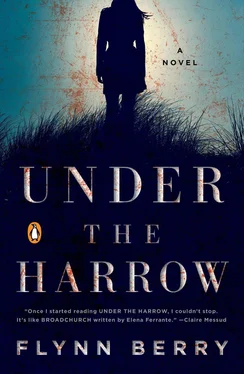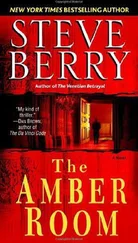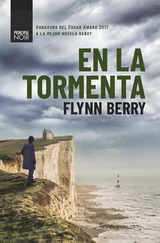“She wasn’t religious. She thought all religions are cults and some, like yours, are just better at distracting people from the fact that they’re cults.”
“I can lead a secular service,” he says. His willingness to please unnerves me. It isn’t what I expect from a priest. “Has it come to that, then?” I ask, and he toes a pebble into the rill. We both watch it sink. He says, “I want to help, and I think a funeral is necessary. To honor her. We have room for one hundred people. Do you want to come inside and see?”
Dust, wood, winter sunlight, black-mullioned windows, the smell of candles like the wax my flatmate in Edinburgh melted down to make encaustic for paintings. An Anglican church. We never had to go when we were children, so it only reminds me of weddings, and Anne Boleyn.
“This would be fine,” I say.
• • •
As we sit in the front pew of the empty church, planning the service, he says, “I did know her.”
“Did you?”
“She sometimes dropped Fenno with me.”
I realize he must not have much to do, that he must be lonely. I picture him chattering to Fenno while they walk and think my heart will break.
We place phone calls. Before calling Helen, I go into the garden and pace along the church wall. Rachel was her best friend and her daughter’s godmother.
Helen has always made me nervous. She moved from Melbourne to Oxford when her daughter, Daisy, was an infant, and raised her on her own while training and then working as a nurse. The thought of Helen maintaining a household, heating infant formula after a shift, dropping her daughter at nursery and picking her up, always made me feel useless. I don’t think I would be able to manage either one, let alone both, and Helen seems to agree.
When she answers, her voice sounds stiff. We discuss the police inquiry, and she agrees to do the eulogy. After a pause, I say, “How did Rachel seem last week?”
“Fine, a little withdrawn. She said work was trying.”
“Why was she staying with you?”
“Her boiler was broken,” she says. “She had no heat.”
Rachel lied to her. I would have noticed if the house were cold on Friday.
“Did she tell you she was moving?” I ask.
“No. To where?”
“Cornwall. She would have been there by now.”
“No, that’s not possible. She didn’t give notice.”
“Who do you think did it?” I ask.
“I don’t know.” She pauses. “It might not have had anything to do with Rachel. It might have been the location.”
“What do you mean?”
“It’s secluded. Close to a major motorway. Where was she moving in Cornwall?”
“St. Ives.”
“I thought she liked the Lizard.”
“We’ve been there. She wouldn’t go to a place she’d been if she wanted to get away from someone. Has she ever mentioned a man named Keith Denton to you?”
“No.”
“Are you certain?”
“Yes. Do you really think that’s why she wanted to move? Cornwall isn’t very far, it’s only five hours.”
“It feels farther,” I say. “And it’s not so easy to find someone. If she changed her name.”
“I doubt she thought she was in danger. She would have reported it.”
“Someone was watching her from the ridge by her house.”
I can tell Helen doesn’t believe me. When I return inside, the priest says, “Did you have any music in mind?”
“Gymnopédie number one.”
He says he will locate a piano player.
“Do people tell you their secrets?” I ask.
“Sometimes.”
“If one of your parishioners told you they had done something wrong, what would you do?”
“I don’t know,” he says. “It would depend on the severity of the transgression.”
• • •
My friends start to arrive at the Hunters on the day before the funeral. This alarms me. I thought they would all stay in Oxford.
I sit on the landing, out of sight, and listen to them bumping into each other. Despite the circumstances, there is something giddy about the encounters, like it’s a reunion or a wedding.
“I didn’t know you were coming,” I hear them say, again and again.
I recognize the voices downstairs, but without any sense of possession. I can’t claim any of them and, hunched on the steps, I’m surprised I ever could.
Then Martha is coming up the stairs at a run. Before I can say anything, she is on the landing and her arms close around me.
• • •
On the night before her funeral, I can’t sleep. The dread grows worse with every hour and warps the next day into something I won’t survive without rest. I don’t have sleeping pills or tranquilizers, but I do have the bottle of red wine I brought from London for Rachel. There isn’t a corkscrew in the room. I go downstairs, but the heavy wooden doors to the bar are locked. Upstairs, I stare at the bottle of red wine. I use a knife to cut the foil and then consider the cork.
There is a screwdriver on top of the bathroom cabinet. Someone must have forgotten it after a repair.
I dig the screwdriver into the cork, pushing it down the neck of the bottle. There is a crash as the cork breaks the seal and wine erupts. Red liquid gushes onto my stomach and drips down my chest.
I sit with the screwdriver in my hand. The wine tracks down my arms along my veins. The wet plasters my shirt to my stomach. There are red spatters on the walls, and already the room smells rancid. I stay where I am, under the stained walls, as the ringing starts in my ears, and grip the screwdriver.
BEFORE THE FUNERAL STARTS, I scan the church and kill each person in exchange for her. They stand three deep behind the benches and along the walls. I recognize some of them from the library, the pubs, the aqueduct. I notice Lewis and Moretti and the woman, the DCI who walked up the hill with Moretti that day. They sit apart, which at first I think is a tactical police maneuver, but is probably only because they arrived separately and the church filled quickly.
Our dad has not turned up. As far as I know, the police have not found him yet, but this is the funeral of his eldest daughter. He might learn of it somehow. He might limp up the aisle and settle in next to me and start to offer theories. The church doors are shut now, and I wonder if anyone would mind if I locked them.
There are too many people I don’t recognize, which I hadn’t expected. I thought I would be able to note any strangers. Whoever did it might come today.
I find Keith Denton in the crowd. Lewis has him in view, across the aisle, and I’m glad since I can’t watch him myself. A dark-haired woman sits in the rear bench, and I turn to Martha. “There’s a journalist here,” I say, pointing to her.
Martha clips down the aisle until she reaches the last row. After some discussion, the journalist stands, squeezes past the others on her bench, and leaves through the main doors of the church. Before she does, she gives me a wry smile, like we are in on a joke together. She doesn’t show any embarrassment, even as the church turns to stare at her, and I envy her. She seems free.
Stephen has arrived, I realize with a sort of terror. He comes up and kisses me on the cheek. He smells of whisky, and from this morning, not last night.
People shift aside to allow him to rest against the wall. He looks exhausted, and I wonder if he also keeps needing to sit down.
They almost got married. Close brush, she said. He still wanted to. They slept together a few times a year, and he thought she would change her mind and move to Dorset with him. She might have done, eventually. She did love him.
I glance at him. His position or balance is wrong, like he might slide off the wall. Moretti said he was at his restaurant, but I wonder if he has proof.
Читать дальше












